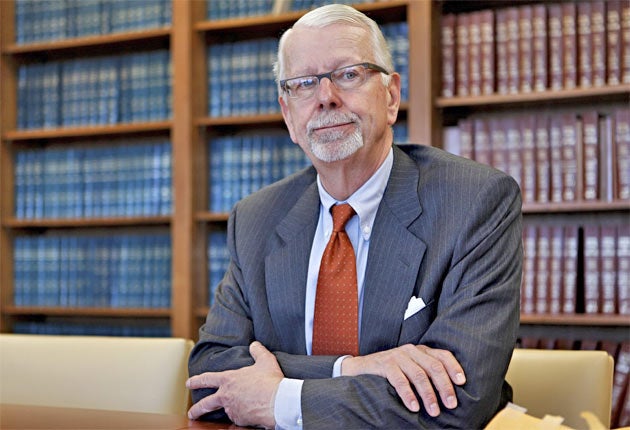Your support helps us to tell the story
From reproductive rights to climate change to Big Tech, The Independent is on the ground when the story is developing. Whether it's investigating the financials of Elon Musk's pro-Trump PAC or producing our latest documentary, 'The A Word', which shines a light on the American women fighting for reproductive rights, we know how important it is to parse out the facts from the messaging.
At such a critical moment in US history, we need reporters on the ground. Your donation allows us to keep sending journalists to speak to both sides of the story.
The Independent is trusted by Americans across the entire political spectrum. And unlike many other quality news outlets, we choose not to lock Americans out of our reporting and analysis with paywalls. We believe quality journalism should be available to everyone, paid for by those who can afford it.
Your support makes all the difference.Supporters of gay marriage are celebrating an important legal victory after a court in San Francisco endorsed a judge’s previous ruling that California’s ban on same sex unions ought to be scrapped because it violates the constitutional rights of citizens.
The decision came after conservative groups attempted to have a decision issued last year by Judge Vaughn Walker thrown out for an alleged conflict of interest: the fact that Walker has been in a committed homosexual relationship for the past decade.
It means that Proposition 8, a ballot measure banning gay marriage which passed by a slim majority of California’s voters in 2008, has moved one step closer to the US Supreme Court, where any decision on its future would be likely to have an impact on every US state.
In August, Mr Walker had ruled that there was “overwhelming evidence” that the Proposition, violated the constitutional rights of gay citizens and “does nothing more than enshrine in the California constitution the notion that opposite-sex couples are superior to same-sex couples”.
He published a 136-page argument supporting his decision, which was carefully written to touch upon issues such as civil rights and the separation of church and state. That gave the case a greater chance of eventually receiving a Supreme Court hearing.
However days later, it emerged that Walker was gay. An alliance of conservative and religious groups opposed to same-sex marriage (who hope to keep the issue out of the Supreme Court) therefore attempted to have the entire judgement expunged from the record.
Ruling against them last night, Walker’s successor, Judge James Ware, said his colleague’s sexuality did not in itself constitute a conflict of interest. “It is not reasonable to presume that a judge is incapable of making an impartial decision about the constitutionality of a law, solely because, as a citizen, the judge could be affected by the proceedings,” he said.
Yesterday’s decision comes at a pivotal moment for same-sex marriage, with most recent polls suggesting that a slim majority of Americans now support it. Public opinion is moving fast on the issue: there has been a 30 per cent swing in favour of gay marriage over the past decade, and support for it has increased by 11 per cent since the 2008 election.
Potential Republican presidential candidates tiptoed around the matter on Monday’s CNN debate. Homophobia is a reliable vote-winner in the “Grand Old Party”, since socially conservative voters still take part in the party’s primary elections in large numbers. But in the wider world, it’s a turn-off for most voters under the age of 30.
Elsewhere, the New York Senate is considering a bill that would make it the sixth US state to recognise gay marriage. It is one or two votes short of being passed, with several legislators still considering their position. On Monday, three undeclared Democrats and one undeclared Republican said that they had decided to support legalisation.
California’s long-running battle over the issue has meanwhile highlighted the highly divisive nature of the debate. Although Mr Walker, who recently retired, is a generally conservative appointee of the first president George Bush, his integrity came under repeated attack in court this week.
If Judge Ware had sided with the conservative plaintiffs, his decision would have had widespread ramifications, since no US court has ever removed a judge from a trial because of his or her race, religion or gender. Black and mixed-race justices are entitled to hear race-relations cases, just as female judges are allowed to rule in sex-discrimination or rape trials.

Join our commenting forum
Join thought-provoking conversations, follow other Independent readers and see their replies
Comments